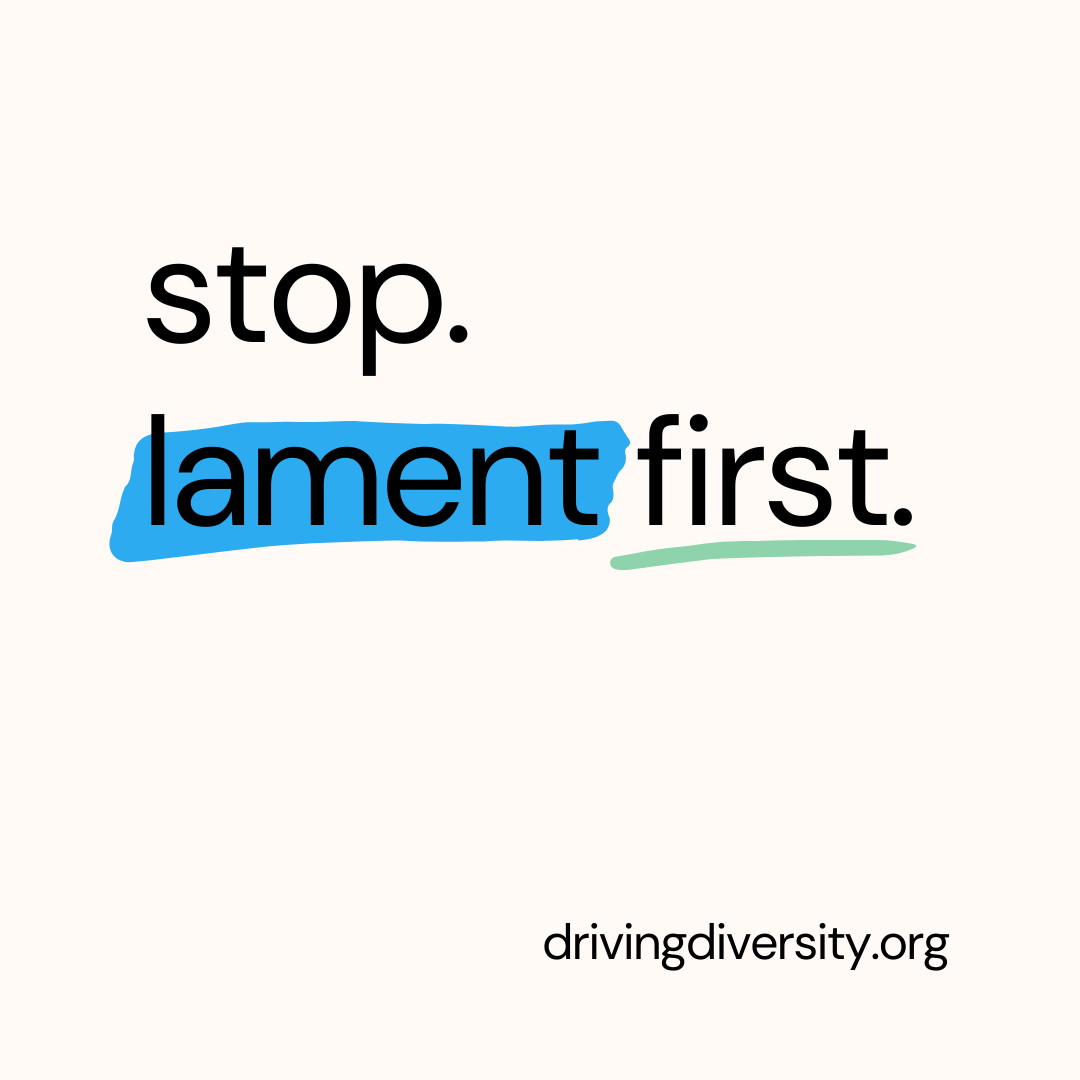 “What’s going on in our world? What’s happening? It seems to be coming apart at the seams.” These are some of the thoughts I hear from people these days. We see civil unrest, demonstrations, and riots. There is a lot of anger on all sides. How should the church respond? Should we jump in with the anger, the rhetoric, the violence? Should we strategize, problem solve, and work at finding solutions? Should we educate ourselves so that we better understand what’s going on? I think before we do anything, we need to stop and lament. A lament is a passionate expression of grief or sorrow. There is so much to grieve over--to mourn, to lament. We need to take the time, a lot of time, to properly lament before we even think about solutions. Why We Lament As the Diversity Director for a national campus ministry, I often find myself crying in prayer. I am entrusted with helping our movement accurately represent our Father and his kingdom through our ministry. This is a somewhat impossible task. The church has mostly failed at this task during most of its history. Yet, we still work at it because it is our purpose as God’s people to represent him—to bear his image in this world. I am compelled to pray and to work. The gravity of the work is not lost on me. I feel the burden of it each day. I see our failures and shortcomings. I listen to the experiences of students and staff from different ethnic groups. I know we can do better. All the time, I see the many ways we can be better image bearers, show the campus a more accurate Christ. And so, I cry. I lament. I mourn. Sometimes, I even wail. When my kids catch me crying in prayer and ask me about it, I tell them, “I’m sad. Crying is what we do when we’re sad.” When there is loss, trauma, injury, and wrongdoing, crying is the right thing to do. We should be brokenhearted over these things. It should make us feel. The Father feels. In Noah’s time, the Father “regretted that he had made human beings on the earth, and his heart was deeply troubled.” He “saw how great the wickedness of the human race had become on the earth, and that every inclination of the thoughts of the human heart was only evil all the time” and He mourned. The Bible is full of examples of God’s heart breaking over the wickedness of humans, over the injustices we perpetrated on each other. No, these are not new, but they are still wrong. If it hurts our God, it should hurt us as well. How can we say we are in fellowship with him, we are his children, if we are untouched by the things that touch him? What We Lament There is so much that needs lamenting that I cannot possibly do it justice in this short article. Here are just two thoughts. Take the time to think and pray through them and the Holy Spirit will bring to mind more areas that need your lament. Injustice. Justice is doing right. The wicked are condemned and the innocent are protected. Think about the history of our country in relation to African Americans, Native Americans, other ethnic groups and the poor. There is no doubt that these groups of people have not found justice in our society. From the time Europeans arrived on our shores, they have endured one injustice after another: enslavement, displacement, rape, murder, separation of families, physical abuse, torture, and dismemberment is not a complete list. Are these ethnic groups the only ones who have faced injustice? Of course not. Human beings and the systems they develop are inherently unjust. The amazing thing about our country for most of our history though, is that it has been assumed justice is primarily for Whites. For others to think they could or should have the same justice has been a foolish thought. God’s kingdom, on the other hand, is inherently just because God is the definition of justice. As citizens of his kingdom we love justice and hate injustice. Just the existence of injustice around us should break our hearts. Letting the suffering of others touch us and caring for their situations is core to the gospel. God became flesh and dwelt among us. He did not shy away from walking in the dirt of this world. He embraced our suffering. Are we not to do the same? Failure. As I mentioned before, the church has mostly failed at accurately representing our Father and his kingdom to the world. If you do not believe that, you need to study the Scriptures and history more. Most of the injustices listed above have been committed by those wearing the Christian banner, sometimes those wearing the missionary banner. We can say these individuals were not “real Christians” and separate ourselves from them like we try to do from the Crusaders and Conquistadores. But how is the world to know the difference if one group is publicly doing wrong in the name of Christ and the other is doing nothing. Of course, there are Christians we can point to in history who stood up for justice, believers like William Wilberforce, Harriet Tubman, and Martin Luther King Jr. But unfortunately, they are the minority, a part of the remnant who did not bow their knees to the idols of the time: greed, complacency, and fear. They chose courage over comfort and often paid with their lives. These are the exceptions. Where were all the other Bible-believing, Spirit-filled believers during these times? Huddled in a corner, disconnected from the world, fearing contamination? As a Pentecostal believer I don’t have to look far to identify our failures. Our movement was birthed in a revival in Los Angeles led by an African American preacher named William Seymour where those gathered were from multiple different socio-economic levels and ethnicities. For a moment we tasted of heaven as believers gathered together and affirmed that there is “there is neither Jew nor Gentile, neither slave nor free, nor is there male and female, for you are all one in Christ Jesus.” Unfortunately, it did not take long for division to arise along racial lines. Is this not something that should be lamented? When we as the church take a good look in the mirror, do we not see many ways we have been complicit with racism, ethnocentrism and white supremacy? lf you need examples of the last, just look at the pictures of Jesus with white skin and blue eyes in many churches’ stained glass or Sunday school materials. How to Lament Brokenness and humility are the words God spoke to me when I asked him four years ago, “what should the church be doing right now.” Brokenness is what happens when we look at all the evil, all the wrong, all the injustice in our world and we allow it to hurt us. We are broken with those who suffer. Humility is the posture we take as we embrace the reality that there is nothing in ourselves that we can do to bring about any change. When we are honest about our frailty and our failures, we find ourselves in place of utter humility. I believe the first way we need to lament is to repent. The main reason we have not moved on as a country or even in the church, is we have not truly repented. Every once in a while, when things happen that we cannot ignore or are hard to deny (though many still try to) we will talk about how we need move on. Many, even in the church, think the trick to moving on is to stop talking about it. If we just stopped talking about racism, it would go away. Where a Christian would get the idea that ignoring a sin causes its disappearance is beyond me. You can find no such pattern in the Scriptures. What you do find is God continually, persistently, relentlessly, sending prophet after prophet telling his people basically the same thing. “Stop worshipping idols. Stop oppressing the poor, widows, and foreigners. Do right. Keep the covenant you agreed to. Be the people you’re supposed to be, so the world knows what I am actually like.” We cannot “move on” until we admit the wrongs we have done in the past and the present. We have to humble ourselves and admit the sins of the church and the country because, as parts of both of them, we have the Biblical obligation to do so (see Daniel 9 for an example of this). We must also repent for our own biases and prejudices. I have an awfully hard time believing I’m the only one in the world with biases and prejudices. If we can be honest and vulnerable about our struggle with lust, greed, and other sins, why can’t we be honest about our struggle with prejudice? The world has made racism today’s unforgivable sin, but God does not recognize this. He offers forgiveness and deliverance from this sin, just like he does all others. Another way for us to repent is to listen. Truth is we are not very good at this. For most of our history, those facing injustice have gone unheard. Even in this time, so many have told me how they feel silenced. You may scoff at this statement as you see the world shouting. But there are many in the church that feel if they were to fully share their thoughts and feelings, even just their experiences with fellow believers they would be attacked. So, they remain silent. Listening, both personally and through articles and other media is the primary way the church needs to repent right now. Listening will open up our hearts towards brokenness and humility. Jeremiah the prophet was broken for his nation. He cared. He cried out, “Oh, that my head were a spring of water and my eyes a fountain of tears. I would weep and day and night for the slain of my people.” Weeping I find is a very appropriate way to lament. I do not mean to say if you are not crying, you do not care. But I do find that deep pain often produces tears. If I think about how we as believers have disappointed God and how this world is so wicked and corrupt, and how so many suffer in it, I often feel pain. I am not advocating the false production of tears, but for the genuine embracing of God’s heart for people. Jesus was once asked why his disciples were not participating in a time of fasting with other religious groups. His answer was simple, “I’m here, so it’s a time for rejoicing,” (my own paraphrase). But he did say the time would come when they would fast. Fasting in Scripture is associated with humility and mourning. We humble ourselves, deny ourselves, because it is a time to mourn. Now is a time to mourn and in place of feasting, we can fast. Isaiah 59 offers a beautiful picture of true fasting. “Is not this the kind of fasting I have chosen: to loose the chains of injustice and untie the cords of the yoke, to set the oppressed free and break every yoke? 7 Is it not to share your food with the hungry and to provide the poor wanderer with shelter-- when you see the naked, to clothe them, and not to turn away from your own flesh and blood? Fasting is an active work of lamentation that, as Isaiah 58 points out, will lead to other works. Yes, we need to stop and lament first. Then, we need to let our lamenting, continual and growing, be the foundation for true fasting. 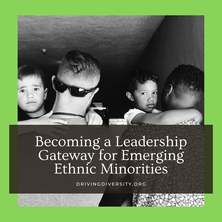 It’s 1:05pm and in the last 4 hours I’ve met with eight high impact missionaries on our Chi Alpha team here in Santa Cruz. Six of them happen to be ethnic minorities. Prior to that I had a staff huddle with two couples that are directors of campus ministries my wife and I planted nearly 20 years ago. Their marriages and ministries are thriving. All of them are ethnic minorities. Of the five Chi Alpha ministries we are focused on planting in the next three years on the West Coast, four directors happen to be ethnic minorities. Two of them happened to be women. It wasn’t until I sat down to write this blog a few minutes ago that I realized just how blessed we are to be a small part in the ever growing picture of empowering a heavenly reflection of His image bearers into leadership. We didn’t arrive here nor will we proceed into greater measures of kingdom reflection by focusing on recruiting tactics in ministry or leadership that are based on earthly ethnicity or culture. As always, if you ask me about kingdom fruit I will direct your attention to the kingdom focus by which it was produced. The driving convictions that have helped us move forward come from a few streams of divine thinking that I would like to unpack. 1. The most authentic expression of the gospel is delivered by the gifts of the Holy Spirit (1 Corinthians 2:4 & 14:24-25). When the focal point of finding pre-Christians is based on what we see and hear the Father doing and saying, we eliminate opportunity for personal comfort or bias to direct the steps of beautiful feet that bring the good news. This focus is tied to the next in that there is no one more relevant than the Holy Spirit. “Outreach” often gets reduced to a form of godliness that denies His power--opportunistic events that lie well within our ability with no need of His power. These events are noble, but often create risk-free environments for our students to show up and meet people within pre-measured settings. Limited to the attractional value our outreaches hold to individual ethnicities. The Lord modeled perfect missionary work in articulation of the gospel and demonstration of power. Not one without the other. The gifts of God reveal the goodness of God and make room for the hardest of Truth to be met with humility. This focus has broken the weakness of personal bias and comfort in reaching students on our campuses. It expands the gateway of bringing people to Christ according to the measure of Gods heart for all ethnicities. This is our foundation to becoming a leadership gateway for Ethnic minorities. 2. Kingdom culture is the perfected state of all culture (Revelation 7:9-10). We do not become culturally relevant by imitating our culture, we become culturally relevant by exemplifying everything our culture was designed to become. This doesn’t mean we ask students or staff to reject their cultural heritage, but our focus is on each person anchoring in their eternal identity in Christ so their culture will be displayed in power and purity, giving glory to God. The Apostle Paul said “I regard no man according to the flesh” (2 Corinthians 5:16). When we remove our focus from attempting to portray expertise, connect based on individual cultures and place it on an authentic display of kingdom culture (His kingdom come…on earth as it is in heaven), Christ is lifted up and all mankind is drawn to Him. This frees the heart of leaders and students to aim at pleasing God and re-presenting Him in love and power rather than the often inadequate attempts to connecting at a carnal level with the multiplicity of ethnicities represented on campus. We were all created to worship. If each believer's witness and connection is an expression of their worship to Him, it creates a gateway for all nationalities to discover, through experience, the God who made them in His image. In other words, a focus on bearing His image begets freedom to bear His image. So our personal culture becomes a being a follower within the perfect culture of His kingdom. 3. We are raising fathers and mothers, not kids (1 Thessalonians 1:6). This is a primary key in becoming a leadership gateway for emerging ethnic minorities. Isaiah 46:10 shows us that our Father’s focus starts with the end from the beginning. When people seek an end of great numerical growth they will always want more students. This is noble assuming the desire to increase attendance is for the sake of spiritual growth and maturity in every attendee. But when the foundational focus of our ministry becomes raising fathers and mothers in the faith we enter into the trans-generational element of spiritual leadership. Similarly we celebrate the desire of any parents that want to have kids. But when that desire is rooted and articulated in the focus of raising great fathers and mothers, it actually shifts the words and actions of how people parent. Remember, semantics are seeds. Our words are the seeds that will form the eternal fruit of our leadership in prayer and instruction. When we form the future by faith just like our Father, in the end from the beginning, our ultimate focus does not become distracted by our immediate options. Our aim to disciple responsible and reproducing men and women of God materializes in the way we raise up and release leaders of all ethnicities into the roles God designed them for. In contrast, when our ministry goal doesn’t exceed “getting more staff on our team” or “getting more students in the door” the impotence of our dreams often only yields our self-sufficient ability to get people like ourselves around us. A focus on raising fathers and mothers of all those entrusted to us will require our hearts to prepare every individual for leadership within our Fathers house without selectively limiting others to our personal comforts or bias. 4. When you get cut my blood falls to the ground (Acts 17:26). We are called to “Reconcile students to Christ…” because this is the only foundation by which mankind can find all authentic reconciliation. There are an unending array of fractions and injustices with varying histories and complexities. But Acts 17:26 says, “And He has made from one blood every nation of men to dwell on all the face of the earth, and has determined their pre-appointed times and the boundaries of their dwellings, so that they should seek the Lord…” (Italicize added). We have all scattered only to be gathered again under one Lord. The reconciliation of all people can't be accomplished in earthly terms--since the beginning of time mankind has found a way to be divided. But the reconciliation of all people CAN be accomplished in the eternal reality of our identities where our bloodlines are reconnected in Christ. Real brotherhood is found in the place where our earthly ethnicities submit to our heavenly identity. I can mourn and rejoice in harmony with anyone who is part of the same Body as me, the Body of Christ. Let me say this frankly. If you want to be a leadership gateway for emerging ethnic minorities, it begins with a commitment to Spirit-led evangelism. The same Spirit that led Jesus to prophecy over a Samaritan woman, Paul to perform works of power amongst the Gentiles, and Peter to become the Apostle to the Jews will lead every staff and student into kingdom diversity that could not be manufactured by any measure of tactical focus on ethnicity. When we keep our focus on the ultimate, our prayers and plans will flush out to reflect and produce that which our heart bleeds for. It isn’t that Jesus won’t give us tactics, it is that His tactics are much simpler than ours. Abiding in connection and grafting all ethnic branches to His vine is a product of authentic witness and practice that flows from a real relationship with God and others. This may seem too simple and and risky. The only risk is that we have less perceived control over the outcome. But our control is only an illusion. If you are exhausted from attempts at making your ministry look like heaven on earth, I challenge you to begin with these four focuses. This is not a comprehensive blog, but I know the fruit we are bearing today can not be attributed to any measure of tactical effort. I pray God will grace you in fulfilling all that is in your heart for reaching and raising up all ethnicities He has surrounded you with. If I can ever be of service to you or your team please don’t hesitate to reach out. Jeremy Anderson [email protected] 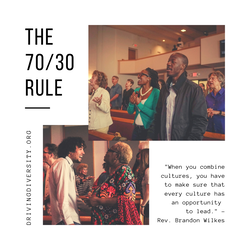 It was around 2007 when when we, Peoples Church Cincinnati, were taking the whole congregation through a 20 week long experience called the “Vision Experience”. It was a small group study that we put together internally to help the congregation grow in racial unity and diverse relationships by having difficult conversations about race in a Christian context. Part of the curriculum included historical information, personal stories, and experiential exercises. During the course of the 20 weeks the leadership committee would evaluate how the groups were performing by getting feedback from the facilitators, the church staff, and our own experiences. At one of these debriefs, I remember discussing a subject that had come up in several of the small groups: people of different cultures and different church backgrounds were not enjoying certain aspects of the church service. At this point in time the church was still very much in transition from being a 98% homogeneous White church to one that was now 15-20% people of color including 1st generation immigrants. Chris Beard, our lead pastor, was pressing forward with a vision of being a Rev. 5:9 church like Heaven: many ethnic groups and languages all worshiping Jesus together. Bringing this vision to fruition was slowly introducing different cultural influences into the church services. Varied preaching styles, an updated look of the facility, and multi-cultural worship music were some of the gradual and radical adjustments that were made. The result was that people who loved Jesus, loved the vision of the church, and wanted to be a part of what God was doing still had difficulty with some aspects of the church. It was during this time that the leadership team came up with the 70/30 Rule to help everyone embrace and celebrate what God was doing in Peoples Church. The 70/30 Rule says that everyone in the church should expect to fully enjoy 70% of what happens at the church while expecting to not feel immediately drawn to or understand the other 30% because that portion is for someone else’s full enjoyment. Furthermore, when something is happening in church that is not of your preference you should celebrate that because that means someone else is feeling connected to Christ and His church in that moment. To help drive this point home, I would say as a service began, “Make sure you young people here today don’t sit down when the worship team goes into that old school hymn! Make sure you stay standing just the same, even though that is not your type of music. Because that song isn’t for you. That song is for the senior saints that are being brought back to the day they fell in love with Christ during that song. So we want you young folks to celebrate with them the same way they celebrate when your repetitive Bethel worship song is played.” Many people can relate to not enjoying certain types of worship music, but when it comes to several cultures coming together people will have cultural clashes in so many situations. Food selection at gatherings, dress code at events, start time for celebrations, length of service, outcomes for meetings, and so many other things are effected by cultural norms. Every culture has their standard for these types of things, but when you combine cultures you have to make sure that every culture has an opportunity to lead. This means that someone is always going to feel out of place and we want that feeling to be celebrated. In effect, the 70/30 Rule is the basis for creating a new culture in an intentionally diverse ministry. The new culture is celebrating being uncomfortable so that others will have comfort. There is no scientific study or mathematic rigor behind the 70/30 percentages, we just went on gut feel when we named it. But over the past 13 years we have found that people embrace it and when they see the beauty of God’s diversely united church they understand the value.  We sat silently at a downtown coffee shop, swirling the Rwandan brew in our cups, the Cincinnati skyscape towering over our sidewalk table — two Ohio Assemblies of God pastors sharing hearts and vision. He asked, “How would you counsel me to lead my (midsize, suburban) congregation into a multiethnic future? I feel a profound burden to do this. We can’t stay where we are. Our city needs this. Our church needs this. But I don’t know what I don’t know.” This wasn’t the first time I’ve heard this. It seems God is burdening many hearts these days for church reflecting heaven on earth. Our own story as Peoples Church Cincinnati involves a 20-year transition from a 98 percent homogeneous white commuter church to a 50 percent nonwhite congregation comprising 30-plus nations. And despite the racially charged times in which we live, we are 25 percent African-American. The Lord has done this. As I contemplated my friend’s earnest question, I felt stirred to reply, “Start with theology. Whatever you do, root it in Scripture. Hell will fight you on this, and when it does, you want this vision anchored in God’s Word.” I shared from Ephesians 2 and 3 about a biblical model of a multiethnic church. The intensity of God’s mind on this matter captivates my heart and astounds me. The Ephesian Model New Testament Ephesus compares to today’s American society. With a mix of Gentile God-fearers, conservative zealots, marketplace liberals, idol worshipers, indigenous people, and internationals, the city was ethnically, economically, religiously diverse. This port population center on the western edge of what is now Turkey flourished as a cosmopolitan melting pot, the Roman Empire’s third most influential city. The Ephesian church was also a collective — united in Christ, Spirit-filled and gospel-rooted. This diverse congregation was making known the “manifold wisdom of God” — in the city and “in the heavenly realms” (Ephesians 3:10). Did you catch that? Not only was the church influencing society and spreading the gospel, but its Christ-centered existence in diverse unity was capturing attention in the spiritual realm. Paul calls this diverse unity of formerly disparate and hostile Jews, Greeks and Romans the “mystery of Christ,” which the Holy Spirit revealed (Ephesians 3:4-6). As this church came together, the mystery of Christ, hidden for ages, became apparent. Let that sink in. Our fractious United States could benefit from the same prophetic, reconciling Kingdom congregations. Such a movement would shake the gates of hell. In Ephesians 2, Paul provides a compelling vision and model for diversely united churches in our day. After unpacking the gospel, he links it to the idea of a diversely united local church. This message is applicable to your church setting — whether rural, suburban or urban. Continue reading here (Used with permission) 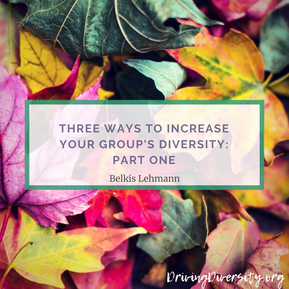 Note: This is written for a Chi Alpha audience, but can apply in any ministry context. Are you dreaming of the multitude of every nation, tribe, people, and language and longing to see God’s kingdom reflected in your local Chi Alpha group? Over the next three weeks we will expound on three simple and proven ministry truths to begin and to make progress in a Holy Spirit transformation in your community. Our first ministry truth is this: you get what you pray for. #1 You Get What You Pray For Jesus said, “Without me you can do nothing.” He wasn’t referring to activity. We are very good at doing stuff on our own. He was referring to fruit, fruit that lasts. (John 15:16) To see eternal change in the lives of human beings, we need the holy sap of Jesus’ life to flow through us, and this requires prayer. The first, second, and last place to accomplish anything of significance is prayer. If you want to be a different kind of group, one that represents your campus and more importantly God’s kingdom, you need divine help. I truly believe you get what you pray for, so pray for… Pray for revelation. Before we can share the vision for diversity, we need a personal revelation of what it means. Diversity is a word that has many definitions in our world, and though we do not find it in the Bible, we certainly find the model of multi-ethnic, unified communities living out a kingdom ethic. Revelation is the product of prayer combined with reading and study. As you delve into God’s word, pray for revelation for yourself, your fellow staff members, your student leaders and every student in your group. Pray for deliverance. There are reasons our churches are racially and ethnically segregated. Some have to do with preference and tastes, but much has to do with sin. The sins of greed, lust, and power birthed the sin of racism in the United States. We cannot build communities that reflect God’s kingdom without deliverance, and we will not experience deliverance without repentance. Repent for your own prejudices and racism. It is also Biblical to repent on behalf of your nation (people group) and country (place where you live) (Daniel 9:3-19). Pray for deliverance from strongholds (entrenched ways of thinking) that influence many of us without our knowledge. Pray for freedom from the world’s ways of thinking, to no longer see anyone from a worldly point of view (2 Corinthians 5:16). Instead pray for new ways of thinking (Rom 12:2). Pray for kingdom-minded hearts. Many who love the vision of kingdom diversity don’t act on it for fear of what will happen in their groups or churches. How will my leaders and congregants respond? In a homogenous group, everything is tailored to the dominant group. How will that group feel when confronted with unpleasant truths and eventual changes? It is vital that you take the time to pray for kingdom-minded hearts. Pray in faith knowing that as you undertake your own journey of allowing God to renew your mind and transform your perspectives, you will be sowing seeds for transformation to happen in others. Pray for protection. If there is one thing I have learned as I work to see our Chi Alpha groups accurately represent God’s kingdom on campus, it is that it is a battle. Anything you do, even if all you are doing is praying (and believe me that is enough), is a direct confrontation to entrenched spirits who have controlled our country for centuries. They have kept people and more importantly Christians separated. This separation, besides maligning the name of Christ, has limited the church’s effectiveness in world missions, reaching cities, executing justice, and yes, this is true even on our campuses. Your confrontation to these powers and principalities will not go unnoticed or unopposed. Pray for protection of your relationships (for this is where retaliation tends to come), your unity, and your community. Guard all your relationships and don’t give way to misunderstandings, wounds, pride, and any kind of unforgiveness. Pray for wisdom. In addition to prayer, there will be things you will need to do and changes you will need to make to see God’s vision for your group come to pass. You can read books and get counsel, but deciding what to do and how to do it will require divine wisdom. These can be difficult waters to navigate. Everyone has an opinion on “diversity issues” and pretty much thinks theirs are right. Confronting strongholds, acting out our repentance, and making intentional changes in what you do, all require enormous amounts of wisdom. Take heart! God promises wisdom to those who ask for it (James 1:5). Pray for partners. Transforming a group from homogenous to multi-ethnic is spiritual work--a work of the Spirit. It is something He alone can and does do. But he also uses vessels like you. However, you alone are not enough. In this case, the goal is also the strategy. Your goal is to see a multi-ethnic body on campus. You must find partners from underrepresented ethnic groups. How? Pray. Pray specifically for what you need and remember you are not praying for something you want, more importantly you are praying for something our Father desires. You are praying as Jesus taught his disciples, “Let your kingdom come and your will be done.” For this is his kingdom and this is his will. You have a dream, a vision, a driving desire to see our Father’s kingdom reflected in your Chi Alpha group. I am ecstatic! I know that our Father is also pleased. After all, it is his kingdom we are representing. And that is what we must remember. It is his kingdom. He is the one who builds it, we are merely his partners and that partnership begins in prayer. This is the place we receive revelation, deliverance, wisdom, kingdom-minded hearts, and protection. This is where we pray for these for others and where God releases others to partner with us. Pray in faith! You get what you pray for. 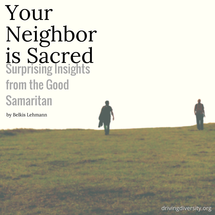 “Who is my neighbor?” This is the question that prompted that great story we know as the Good Samaritan. You can read it in Luke chapter 10. This is how it came about: On one occasion an expert in the law stood up to test Jesus. “Teacher,” he asked, “what must I do to inherit eternal life?” 26 “What is written in the Law?” he replied. “How do you read it?”27 He answered, “‘Love the Lord your God with all your heart and with all your soul and with all your strength and with all your mind’[c]; and, ‘Love your neighbor as yourself.’”28 “You have answered correctly,” Jesus replied. “Do this and you will live.”29 But he wanted to justify himself, so he asked Jesus, “And who is my neighbor?” I love Luke’s commentary in verse 29. He makes a point of telling his readers that the motivation behind the law expert’s follow-up question was to justify himself. How like an expert of the law to try to find a loophole in the great commandment. And how like our Lord to answer a question of geography with a story of behavior. Because, as this parable shows us, love is, after all, a verb. Jesus turned the word neighbor from a noun dealing with location to a verb dealing with action rooted in value. You see the Samaritan made a value decision when he decided to actively show kindness to the man who was robbed. He decided this man had great worth. He decided his neighbor was sacred. Jews had no dealings with Samaritans. This was due to a complicated history of abuse and oppression that caused each group to severely dislike and distrust each other. The road to Samaria was full of thieves, many of whom were most likely Samaritans. It was not unusual for a lonely traveler to fall the victim to crime. The man in this instance should really not have been traveling alone. That’s probably what the priest and the Levite who passed on the other side thought. Today we see it as a lack of compassion, they probably saw it as a sign of wisdom. If while traveling a dangerous road you come upon a victim of crime, you are left with little doubt that this is indeed a dangerous place and it is best to make good speed and get out of there fast! These two religious leaders were simply responding from the basic human instinct of self-preservation. Can we really blame them for that? Would we do any differently? Do we today? That is why the Samaritan’s behavior is so mind blowing. He does that exact opposite. He does not protect himself. On the contrary, he puts himself in danger in several ways. First, he places himself at risk by helping a Jew whose fallen victim to his own countrymen. Isn’t he siding with the enemy? Is he really thinking through what this could mean for him within his own cultural group? We think it sweet that the Samaritan showed kindness to the enemy of his people. Would his own people view it the same way? He also places his life in peril by taking this unconscious, naked Jew, putting him on his own donkey and taking him to an inn. What is to stop anyone he encounters along the way from thinking he is the criminal in this case? Here is the man on his donkey, in his possession. Think of the exact situation today. What would happen if an Israeli soldier came upon a fellow countryman naked, beaten, and unconscious in a Palestinian’s car? Would he thank the Palestinian or shoot him? Seen in this light, it seems the Samaritan could use some of the wisdom of the Levite and the priest. His actions really do not make sense. Why would he engage in such dangerous behavior? Obviously he values the life of this stranger, not just as much as his own, but more than his own. And that sounds just like the kind of point Jesus would make. After all he did say, “Greater love has no one than this: to lay down one’s life for one’s friends. (John 15:13)” The amazing truth here is that this man lays his life down, not for his friend, but literally for his enemy. This is so the kind of standard Jesus espouses, a truly insane--way beyond basic human instinct, reason, or common sense--definition of love. It is not the way of this world, but of our Father’s kingdom, modeled by our Lord himself. “But God demonstrates his own love for us in this: While we were still sinners, Christ died for us.” (Romans 5:8). The son laid down his life for his Father’s enemies. Are his followers to do less? Please hear me. What Jesus says to this expert in the law is more than a legal reply. He is not talking about how to meet conditions or standards. He is not sharing pretty platitudes regarding how we use our time and our need to make room for interruptions. He is saying to this man, to his hearers, to Luke’s readers, and to us today, that love is not a matter of geography and thus convenience. It is a matter of value resulting in dangerous, crazy actions. Of course, the parallels to our modern cross-cultural, cross-racial relationship are hard to miss. Today, in our country and our world, believers are tempted to huddle in groups under the banner of wisdom and self-preservation. We have our own histories that have resulted in dislike and distrust between neighbors and countrymen. But we are enticed to distance ourselves from them, to label them as other, and thus free from our compassion, kindness, understanding, or relationship. The world tells us to put aside our differences and tolerate each other, learn to live together. Our Lord asks us to lay down our lives and risk misunderstanding, repercussions, and even death to be a neighbor. YES, doing so will get us labeled and rejected by both our group and others. It will also put us in great company with Jesus himself. We can do no less when once we realize our neighbor is sacred.  This week our Chi Alpha visited Riverside church in Atlanta. Big shout out to Pastor Dale Stephens and Pastor Tim McNeeley and that crew. God is doing a good work through that ministry down there. During a morning devotional, we learned about the value we put on things. Pastor Dale asked us the question, “How can you help raise someone's value so that their identity will rise in value as well? In our fight for kingdom diversity, we must be willing to put value on kingdom diversity. As we take a look at our leadership and our campus groups, does it reflect kingdom diversity? If it does not, what is it we must do to help our groups become more like the Kingdom of God? When we put value on Kingdom diversity, we will do whatever it takes. No matter the cost, no matter the comfort lost, we will make it happen. The questions we must ask ourselves to do this is:
As we do this, we will be fulfilling the Law of Christ; Love your neighbor as yourself. Let us set the standard of valuing every nation, tribe and tongue on our campus. SELAH 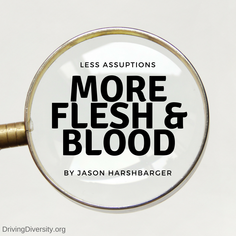 "How do you expect me to be a man when I have never had a f^&@ing man in my life?!" These words pounded my heart like a heavy weight descending through a bucket of water. I heard these words in a group of African-American young men I gathered with on Monday afternoons. This group, called B.O.S.S. (Brotherhood of Successful Scholars), had graciously taken me in and allowed this 30-something white guy from the cornfields of Indiana to be a part of their fellowship five years prior. On this particular night, we were exploring what it means to be a man and to hold your head high. The thoughts that flowed in discussion ranged from making money to showing the world that you should be respected to keeping your options open in your love life. The discussion began to pick up when someone interjected, "real men need to live with integrity." One of the young men in our group, who through his self-confession was attempting to leave behind a period of dealing drugs on campus, was troubled by this statement. He grew up in a home where there was no father, no husband and no male image-bearer of Christ. All he had known was his mom and grandmother. All he had known of being a man was to man up and make your way through; keep living and surviving, do what you need to do to stay alive. Now, he is being told to be a man with integrity. What exactly is that? This discussion got me to thinking: I believe we assume to much. We assume that if we tell people to do something that they will already know what that something is. We assume people have a mutual baseline of common sense (thus revealing our naivete). We even assume that varying people groups in this nation will all see things from the same point of view (yikes!). In this case, this young man got me to thinking about my assumptions. Do I assume young men know what it will look like to be a man? Do I assume that even from one people group to another there will be common streams of thought and standards for manhood? I make too many assumptions... However, here is where the good news comes in: just like Paul told the Colossians (1:24b) "...in my flesh I do my share on behalf of His body (which is the church) in filling up what is lacking in Christ's afflictions." (NASB), I also had the same opportunity. We have the same opportunity. What the believers in Colossae lacked was not hearing what Jesus had done for them, or believing what Jesus had done for them. No, what they lacked was flesh and blood; seeing what Jesus had done for them. Thus, through Paul's suffering for proclaiming Jesus' Name, these believers were able to see and experience in flesh and blood what that looked like. Similarly, young students (esp. young men) on our campuses throughout the country have heard about men...fathers, husbands, men of integrity...but until they see these men they may not truly believe they exist. Until they can experience them in flesh and blood, there will be something pivotal missing in their lives, freeing them to change the trajectory of their lives to in fact become these men of integrity. Until they can rub elbows with, ask questions to and do life with these men, they will not be able to become one of them. Here is where we come in: we can do this. What I realized was that my ministry amongst this group of African-American young men was me. I needed to live out what a quality husband looked like, what a father who cared about his children was, and what a man of integrity looked like in flesh and blood. I need not focus on being super relatable or even pretend to understand all that they go through as a minority. Just love them where they were for whom they were, and then show out what a man of God looks like. No performance needed, only truth, integrity and care. Already we have seen some young men's lives dramatically changed by the Gospel because of this. We can do this. Can we take some time to look about us and see what assumptions we have that we may need to reconsider? Can we take a few moments to consider who has lack around us (like the Colossians) that we may be able to fill up with our flesh and blood? If so, the Spirit will make you aware of opportunities around you that need Gospel, that need flesh and blood. May you become good news to those lacking around you. 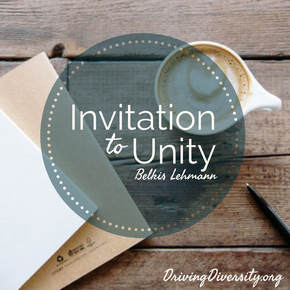 Fellowship. It’s more than potato salad and pies. It’s intimate sharing, a comingling of persons. It’s taking individuals and making them one. John the apostle in his letter we call 1 John states clearly his intent in proclaiming what he has seen and heard concerning the word of life that they (his audience) have fellowship with “us”. The “us” being the Christian community. “And our fellowship is unto the Father and with his son Jesus Christ.” This is beautiful but not original with John. He’s simply calling others to the place he was called by Jesus himself. He records in what we call the gospel of John, “Anyone who loves me will obey my teaching. My Father will love them, and we will come to them and make our home with them.” What a promise! “We will come and make our home with them.” This is fellowship. Abiding in the vine, living in relationship with the Father, the Son, and the Holy Spirit. “‘As the Father has loved me, so have I loved you. Now remain in my love. If you keep my commands, you will remain in my love, just as I have kept my Father’s commands and remain in his love. I have told you this so that my joy may be in you and that your joy may be complete. My command is this: Love each other as I have loved you. Greater love has no one than this: to lay down one’s life for one’s friends. You are my friends if you do what I command. I no longer call you servants, because a servant does not know his master’s business. Instead, I have called you friends, for everything that I learned from my Father I have made known to you. You did not choose me, but I chose you and appointed you so that you might go and bear fruit—fruit that will last—and so that whatever you ask in my name the Father will give you. This is my command: Love each other.’” John 15:9-17 (NIV) Notice that the invitation to fellowship with the Father is also an invitation to fellowship with each other. We are not the only ones in the vine. To love God is to love each other. Of course the command to “love each other as I have loved you” would appear right here. Right where the disciples were told “as the Father has loved me, I have loved you.” The Father’s love is the foundation of the gospel and it became flesh in Christ. Thus, John testifies to what he saw and heard. But the call is for his disciples then and now to do the same. Love each other as they have been loved. It is an invitation to true fellowship. Not potlucks and parties, but laying down our lives one for another. Today we also receive this invitation to love, an invitation to unity. An invitation to fellowship with the Father, the Son, the Holy Spirit and with believers from every nation, tribe, people, and language. “‘My prayer is not for them alone. I pray also for those who will believe in me through their message, that all of them may be one, Father, just as you are in me and I am in you. May they also be in us so that the world may believe that you have sent me.’” John 17:20-21 (NIV). 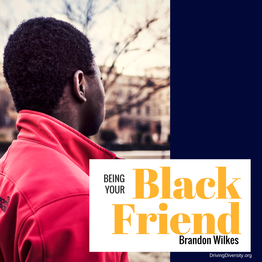 I was recently watching a television show where the host, a white woman, was discussing the topic of Black Lives Matter with a guest. The host was a proponent for the Black Lives Matter movement, and I was happy to see her using her platform to help other people understand more about racial inequality. At one point in the show, the host was encouraging other white people to gain more understanding about the topic through books and relationships with black people. In the middle of her encouragement she self corrected herself and said something like “but you shouldn’t go looking for black friends just to learn about what it’s like to be black, nor should you expect your black friends to be responsible for teaching you about their black experiences.” While I understood that she was trying not to put a greater burden on black people to be responsible for white people's ignorance, I disagree with the idea that black people or any other minority should shy away from sharing their life experiences with white people to intentionally educate them. As a black man I definitely understand that minorities don’t want to be brought into relationships to be someone’s token friend. I, like everyone else, want to be valued in life and especially friendships, for who I am, not what I look like. However, I know and other people of color should recognize, that who we are has largely been connected with what we look like. A great deal of our experiences in life have been influenced by our race. Where we live, our family dynamics, the food we eat, our struggles, accomplishments, and even the way we speak is connected in one way or another to our race. So the desire to be valued for who we are is inseparable from our looks; I am who I am because I am black. As a result, I have no issue with a white person wanting to be my friend because they desire to learn about my life as a black man. In fact, I don’t think it would be much of a friendship if they didn’t want to know about me. I teach a class about racial reconciliation in the church. The class is based on a book called Multiethnic Conversations by Oneya Okuwobi and Mark Demaz. As part of the class I encourage people to intentionally make friends with people who are different from themselves. While the encouragement is for the whole group, the people who are usually most in need of diverse relationships are the white people in the class. Because of the United States’ history of racism and by virtue of being the majority, white people have the opportunity to live in an almost exclusively white environment for the majority of their lives. Without making any effort, they may never have a need for non-white relationships. As a result, they often live segregated lives without really even knowing it. Minorities on the other hand must develop relationships with white people in order to navigate through the U.S. Minorities also tend to seek each other out when in majority white environments and therefore develop more cross racial relationships. Because of these realities, white people often have to be very intentional about making cross racial friendships while minorities do not. If they are not intentional they will never learn about the life experiences of other races. And if non-white people are not willing to befriend white people who have a desire to learn, then ignorance persists and no progress is made. Yes, they can read a book and learn some history, but we all know that a personal story is more impactful than a history lesson. I believe that this is extremely important for those of us in the church. We stand on a foundation that is more significant than our race or our personal preferences. If white people are not intentional about seeking cross racial friendships and minorities are not open to being that friend, then the church will remain segregated and our witness will continue to wreak of hypocrisy. For the cause of the gospel, white people need to take on the primary responsibility of intentionally seeking these relationships. They must do so recognizing that they will be uncomfortable and are possibly subjecting themselves to rejection. I believe their faith can stand up to someone not wanting to be their black friend. And for the same gospel, minorities should be willing to accept these sincere friendship requests. Perhaps Christ will be glorified, and a real friendship will result from the awkward one that began as you being their black friend. |
Categories
All
Contributing Authors
|

 RSS Feed
RSS Feed